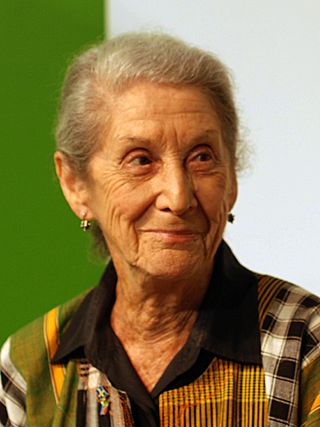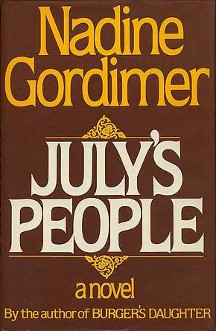Related Research Articles

Nadine Gordimer was a South African writer and political activist. She received the Nobel Prize in Literature in 1991, recognised as a writer "who through her magnificent epic writing has ... been of very great benefit to humanity".
Zoë Wicomb is a South African-Scottish author and academic who has lived in the UK since the 1970s. In 2013, she was awarded the inaugural Windham–Campbell Literature Prize for her fiction.
New Age was an influential leftist newspaper in Johannesburg operating from 1953 to 1962. It was formed with the co-operation of a number of left-wing groups in the area; New Age received the assets of the communist Jewish Worker's Club, which had been liquidated in 1948. The newspaper later received support from a committee of the anti-apartheid South African Students' Association.
Lakshmi Persaud was a Trinidad-born, British-based writer who resided in London, England. She was the author of five novels: Butterfly in the Wind (1990), Sastra (1993), For the Love of My Name (2000), Raise the Lanterns High (2004) and Daughters of Empire (2012).
Rose Zwi was a Mexican-born South African–Australian writer and anti-apartheid activist best known for her work about the immigrants in South Africa.

July's People is a 1981 novel by the South African writer Nadine Gordimer. It is set in a near-future version of South Africa where apartheid is ended through a civil war. Unlike Gordimer's earlier work, the novel was ignored by the apartheid government's censor, though the book's South African publisher was later raided by the Security Police.
Beverley Naidoo is a South African author of children's books who lives in the UK. Her first three novels featured life in South Africa where she lived until her twenties. She has also written a biography of the trade unionist Neil Aggett.
The Indian diaspora in Southeast Africa consists of approximately 3 million people of Indian origin. Some of this diaspora in Southeast Africa arrived in the 19th century from British India as indentured labourers, many of them to work on the Kenya–Uganda railway. Others had arrived earlier by sea as traders.
Miriam Tlali was a South African novelist. She was the first black woman in South Africa to publish an English-language novel, Muriel at Metropolitan, in 1975. She was also one of the first to write about Soweto. She also wrote Amandla in 1980 which focuses on the Soweto Uprising in 1976, as well as a collection of short stories called Soweto Stories which was published in 1989. Most of her writing was originally banned by the South African apartheid regime.

Tamil South Africans are Indian South Africans of Tamil descent. Tamil people form the majority of Indian immigrants who came from India to Natal, South Africa, from 1860 onwards. After the expiry of their indentures most of these Indians moved to the cities, becoming established as a thoroughly urban population.

Elleke Boehmer, FRSL, FRHistS is Professor of World Literature in English at the University of Oxford, and a Professorial Governing Body Fellow at Wolfson College. She is an acclaimed novelist and a founding figure in the field of Postcolonial Studies, internationally recognised for her research in colonial and postcolonial literature and theory. Her main areas of interest include the literature of empire and resistance to empire; sub-Saharan African and South Asian literatures; modernism; migration and diaspora; feminism, masculinity, and identity; nationalism; terrorism; J. M. Coetzee, Katherine Mansfield, and Nelson Mandela; and life writing.
Rozena Maart is a South African writer, and professor, currently living in Durban. She is the Director for the Centre for Critical Research on Race and Identity. She has been recognized for her writing, and for her work opposing apartheid and violence against women. She has lectured throughout Canada, the United States and many parts of the world.

Lauren Beukes is a South African novelist, short story writer, journalist and television scriptwriter.

Zukiswa Wanner is a South African journalist, novelist and editor born in Zambia and now based in Kenya. Since 2006, when she published her first book, her novels have been shortlisted for awards including the South African Literary Awards (SALA) and the Commonwealth Writers' Prize. In 2015, she won the K Sello Duiker Memorial Literary Award for London Cape Town Joburg (2014). In 2014, Wanner was named on the Africa39 list of 39 Sub-Saharan African writers aged under 40 with potential and talent to define trends in African literature.

Jameela Siddiqi is a London-based British novelist, journalist. She is a broadcaster, linguist and specialist in Indian classical music and poetry. Siddiqi is the author of post-colonial fiction dealing with themes of expulsion, migration identity and exile. She is also known for her work in the devotional music of Hindus, Muslims and Sikhs.

Shilpi Somaya Gowda is the award-winning, New York Times and internationally bestselling Canadian author of Secret Daughter, The Golden Son, and The Shape of Family. She lives in California with her family.
Penny Busetto is a South African writer known for her 2014 novel The Story of Anna P, as Told by Herself. The Story of Anna P, as Told by Herself was awarded the 2013 European Union Literary Award as well as the 2014 University of Johannesburg Debut Prize, and in 2016 was shortlisted for the Etisalat Prize for Literature.
Yasmine Gooneratne was a Sri Lankan poet, short story writer, university professor and essayist. She was recognised in Sri Lanka, Australia, throughout Europe, and the United States, due to her substantial creative and critical publications in the field of English and post-colonial literature. After 35 years in Australia, she returned to reside in Sri Lanka.
Agnes Sam is a South African writer.
Jayapraga Reddy (1947–1996) was an Indian South African writer of short stories, plays, and a memoir.
References
- ↑ Karodia, Farida (1988). Coming Home and Other Stories. Oxford, UK: Heineman. ISBN 0435907387.
- ↑ Pirbhal, Mariam (2009). Mythologies of Migration, Vocabularies of Indenture: Novels of the South Asian Diaspora in Africa, the Caribbean, and Asia-Pacific. Toronto: University of Toronto Press. Archived from the original on 23 February 2014. Retrieved 26 April 2013.
- ↑ International Festival of Literature Berlin. "Farida Karodia". Archived from the original on 24 February 2014. Retrieved 26 April 2013.
- ↑ Penguin. "Boundaries Book Description". Archived from the original on 17 May 2013. Retrieved 26 April 2013.
- ↑ Pirbhal, Mariam (2009). Mythologies of Migration, Vocabularies of Indenture: Novels of the South Asian Diaspora in Africa, the Caribbean, and Asia-Pacific. Toronto: University of Toronto Press. Archived from the original on 23 February 2014. Retrieved 26 April 2013.
- ↑ Frenkel, Ronit (2010). Reconsiderations: South African Indian Fiction and the Making of Race in Postcolonial Culture. Johannesburg: Unisa Press, University of South Africa.
- ↑ Goviden, Devarakshanam (2008). 'Sister Outsiders': The Representations of Identity and Difference in Selected Writings by South African Indian Women. Johannesburg: Unisa Press, University of South Africa.